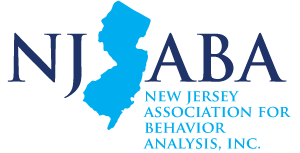Event Co-Chairs Marlene Brown, M.S., BCBA, LBA-NY and Quintara Tucker, MS, BCBA, IBA, LBS, LBA-MI, LBA-NJ compiled this information. Please feel free to reach out with your ideas, questions, and more
Within this section, you can expect to find:

Welcome to the 2025 NJABA Conference!
The event will again be held at The Palace at Somerset Park in Somerset, NJ.
The main event on Friday April 25, 2025 will be a hybrid event again this year with BehaviorLive hosting and providing recordings for later viewings. Call for papers are open Mid November to mid December 2024 and Registration for Sponsors will open by early December 2024. Registration for attendees will open in early 2025.
Keynote Speakers include:
Dr. Matthew Brodhead as our pre-conference workshop speaker and
Dr. John Borrero as the opening keynote speaker and featured speaker Dr. Bridget Taylor for the main conference.
We look forward to seeing you at the 20th Annual Conference.
Keynote Speaker: John Borrero, Ph.D. BCBA-D
Dr. Borrero earned his Ph.D. from the University of Florida. He is Professor of Psychology at UMBC, a Board Certified Behavior Analyst, and Licensed Behavior Analyst in the state of Maryland. At UMBC Dr. Borrero directs the Applied Behavior Analysis M.A. track and mentors doctoral students in Applied Developmental Psychology. Dr. Borrero has published over 60 articles and chapters and his work has addressed a variety of topics including the assessment and treatment of severe challenging behavior, choice, and strategies to promote infant development. Dr. Borrero is the 2008 recipient of the B. F. Skinner New Researcher Award and the 2021 recipient of the Don Hake Translational Research award, both presented by Division 25 of the American Psychological Association. Dr. Borrero serves of the Board of Directors of the Society for the Experimental Analysis of Behavior, and currently serves as Editor-in-Chief of the Journal of Applied Behavior Analysis.

Keynote Speaker: Matthew T. Brodhead, Ph.D., BCBA-D
Matthew T. Brodhead is an assistant professor at Michigan State University. He is the Director of Spartan Caregiver Support, a service that provides free and evidence-based support to caregivers of people with autism within the State of Michigan. He is also the Research Director of the Early Learning Institute. Dr. Brodhead’s research examines focused social skill interventions for children with autism. He also writes about conceptual issues relating to the ethical and professional behavior of practicing behavior analysts. Through workshops and consultation, he has established multiple school-based programs for children with autism, and he has provided training to teachers, related service providers, and behavior analysts both nationally and internationally. Finally, he specializes in program evaluation for both applied behavior analysis and public school placements for individuals with autism. Dr. Brodhead received both his B.S. in Psychology in 2008 and his M.A. in Behavior Analysis in 2010 from Western Michigan University. In summer of 2010, he moved to Logan, Utah and attended Utah State University, where he received his Ph.D. in Disability Disciplines in 2014 under the guidance and mentorship of Dr. Tom Higbee. Dr. Brodhead holds a BCBA credential with a doctoral designation (i.e., BCBA-D). He is also a licensed behavior analyst in the State of Michigan.

Special Guest Presentation: Bridget Taylor, Ph.D., PsyD, BCBA-D
Dr. Bridget Taylor is the co-founder and CEO of Alpine Learning Group and serves as the Senior Clinical Advisor for Rethink Behavioral Health. She co-hosts Our Next Guest, a popular interview-style webinar series featuring live discussions with renowned behavior analysts on topics relevant to both clinicians and families. A Board Certified Behavior Analyst and Licensed Psychologist, Dr. Taylor has played a pivotal role in the field of applied behavior analysis and autism intervention for over 35 years. She is a past president of the Behavior Analyst Certification Board and a former Associate Editor of the Journal of Applied Behavior Analysis. Currently, she serves on the board of the Society for the Experimental Analysis of Behavior (SEAB). Dr. Taylor is widely recognized for her contributions to autism research and treatment. She has published numerous peer-reviewed articles and book chapters on innovative practices to improve the lives of individuals with autism. Her most recent work explores compassionate relationship-building with families when providing clinical services to individuals with autism. In recognition of her outstanding contributions, she has been honored by the Association for Applied Behavior Analysis International (ABAI) and awarded the prestigious ABAI Fellow designation.

Main Conference Keynote Abstracts
Keynote Abstract presented by John Borrero, PhD BCBA-D
Have it Your Way: Preference for Single Outcomes and Event Sequences as Indices of Social Validity
Recent research has shown that many individuals with intellectual and developmental disabilities prefer to wait and have accumulated access to their reinforcers, rather than experience small but immediate access to their reinforcers. Similarly, human decision making research has shown that when selecting the order of a sequence of events (e.g., meet with an abrasive family member, or have dinner at your most preferred restaurant), people typically prefer an improving series of events when the choice involves a sequence of outcomes, termed negative time preference. I will present abbreviated summaries of our research on distributed vs. accumulated access and factors that contribute to and work against negative time preference. I will conclude by connecting this work to the construct of social validity by suggesting that it be assessed on a continual basis so that we may help our clients shine and so that we may shine a positive light on the science and practice of applied behavior analysis.
Learning Objectives:
Pre- Conference Workshop Presenter Matthew Brodhead, Ph.D. BCBA-D
Pre- Conference Workshop Presentation:
A Tutorial on Using Behavioral Systems Analysis to Improve Documentation Practices
Documentation may seem like an every-day, mundane responsibility of a behavior analyst fulfilling their obligations to their clients and payers. However, good documentation practices can be just as beneficial to the behavior analyst. For example, a behavior analyst may be called to testify about a behavior plan in front a judge in a parental custody dispute, or they may be questioned by local law enforcement about a suspected case of abuse. Here, good documentation practices can increase the likelihood that an independent party (e.g., a judge or law enforcement) will find the behavior analyst’s account credible. Proper documentation practices are therefore critical to not only fulfill the behavior analyst’s ethical and legal obligations to client protection, but to also protect their own interests, livelihood, and ability to practice. The purpose of this presentation is to describe systems for how a behavior analyst can improve their documentation practices. The presentation will also feature useful tools, tricks, and strategies that behavior analysts can immediately put to use.
Learning Objectives:
1. Participants will describe ethical benefits of proper documentation practices
2. Participants will list and identify the six steps of behavioral systems analysis
3. Participants will use the six steps of behavioral systems analysis to identify and develop behavioral systems to improve documentation practices
4. Participants will describe strategies for measuring the efficacy of their documentation practicess
CEU Type: Ethics

Congratulations to our 2025 Distinguished Service Award winner, Sharon A. Reeve, Ph.D., BCBA-D, LBA!


